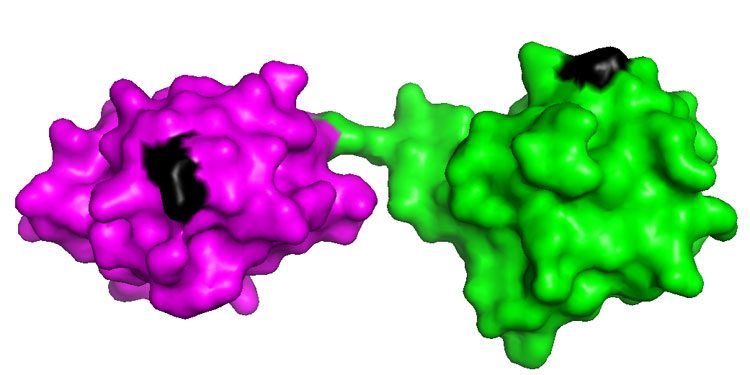
Ubiquitin is a small protein that can be linked to other cellular proteins, thereby controlling and modulating their functions. The attachment occurs in many different forms, either as single molecule or in the form of distinct ubiquitin chains, leading to diverse conformations and varying cellular outcomes. Scientists often refer to it as the secret ubiquitin code, which still needs to be fully deciphered. Researchers at the Goethe University Frankfurt, together with partners from the University of Tübingen in Germany and Queen Mary University as well as Francis Crick Institute from London (UK) have now developed a novel technology to tackle that.
Recently, scientists discovered that ubiquitin molecules are not only assembled in a non-linear manner, but also build linear chains, in which the head of one ubiquitin is linked to the tail of another ubiquitin molecule. So far, only two highly specific enzymes are known capable of synthesizing and degrading such linear ubiquitin chains, and both are being extensively studied at the Institute of Biochemistry II at the Goethe University Frankfurt. However, target proteins of linear ubiquitination, as well as their specific cellular functions, have largely remained elusive. The novel technology developed by the team around Koraljka Husnjak from the Goethe University Frankfurt now enables the systematic analysis of linear ubiquitination targets.
“The slow progress in this research area was mainly due to the lack of suitable methods for proteomic analysis of proteins modified with linear ubiquitin chains”, explains Koraljka Husnjak whose native country is Croatia. Her team solved the problem by internally modifying the ubiquitin molecule in such a way that it maintains its cellular functions whilst at the same time enabling the enrichment and further analysis of linear ubiquitin targets by mass spectrometry.
With this technology at hand, it is now possible to identify target proteins modified by linear ubiquitin, and to detect the exact position within the protein where the linear chain is attached. Scientists praise this highly sensitive approach as an important breakthrough that will strongly improve our understanding of the functions of linear ubiquitination and its role in diseases.
Dr. Husnjak already provided the proof of this concept and identified several novel proteins modified by linear ubiquitin chains. Amongst them are essential components of one of the major pro-inflammatory pathways within cells. “Linear ubiquitin chains relay signals that play an important role in the regulation of immune responses, in pathogen defence and immunological disorders. Until now we know very little about how small slips in this system contribute to severe diseases, and how we can manipulate it for therapeutic purposes” comments Husnjak the potential of the new technology.
Errors in the ubiquitin system have been linked to numerous diseases including cancer and neurodegenerative disorders such as Parkinson’s disease, but also to the development and progression of infections and inflammatory diseases.
Source: Press Release 22/03/17








